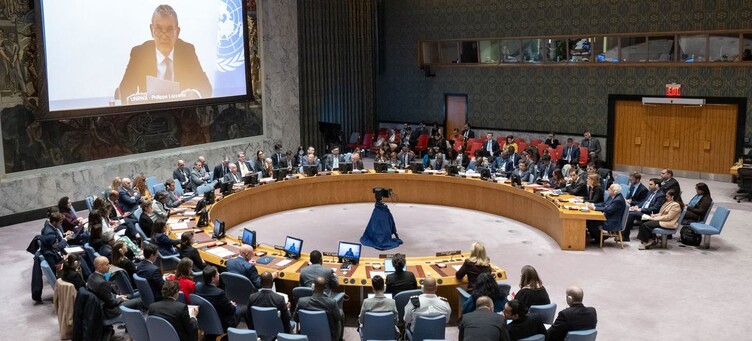By: Ahmed Fathi
【New York INPS Japan/ATN=Ahmed Fathi】
The United Nations Security Council convened a high-stakes emergency meeting to address the escalating crisis in Gaza, with a focus on the ongoing Israeli military operations inside the territory, which were triggered by rocket attacks and the subsequent cutting of communications and electricity. The meeting was initiated at the request of the United Arab Emirates (UAE) as tensions in the region continued to mount.
UNRWA’s Chief, Philippe Lazzarini, delivered a resolute statement during the meeting, condemning the blockade of the Gaza Strip as a form of collective punishment. He expressed deep concern over Israel’s evacuation orders, characterizing them as forced displacement tactics. Lazzarini unveiled a startling statistic, revealing that nearly 70% of the casualties resulting from the recent bombardment in Gaza were women and children. He also lamented the loss of 64 of his colleagues in just three weeks, marking the highest number of UN aid workers killed in such a short period anywhere in the world.
Lazzarini emphasized the feelings of Gazans who believe they are not being treated equally with other civilians and decried the world’s tendency to equate all Gazans with Hamas. He highlighted that the actions of Hamas should not absolve Israel of its obligations under International Humanitarian Law.
UNICEF’s Executive Director, Catherine Russell, echoed Lazzarini’s concerns and urged the adoption of a resolution calling for an immediate ceasefire. She stressed that children should not bear the brunt of conflicts, emphasizing the importance of collective efforts to ensure the safety and security of children.
Furthermore, Russell called for the rescission of the order for 1.1 million Palestinian civilians to leave northern Gaza and demanded that demands for hospital evacuations cease, as they are protected under International Humanitarian Law.
During the meeting, Lisa Doughten, Director of Humanitarian Finance and Partnerships at UNOCHA, expressed grave concerns about the potential for further escalation. She warned that the current situation in Gaza could pale in comparison to what might unfold, including the real risk of regional escalation and spillover.
Brazil’s Foreign Minister, Mauro Vieira, delivered a direct and assertive statement. He emphasized that it is impossible to rescue hostages and provide humanitarian aid amid heavy shelling. He criticized the Security Council’s inaction, suggesting that some have compared it to lying beneath the rubble in Gaza. Vieira questioned how many more lives must be lost before the UN Security Council transitions from rhetoric to decisive action.
The UAE Ambassador to the UN, Lana Nusseibeh, firmly stated that Israel’s announcements regarding shelters and hospitals in Gaza as potential targets or warnings to evacuate do not change their protected status. She expressed concerns that the Security Council’s inaction was not serving Israel’s security interests while civilians were paying the price.
China’s Ambassador to the UN, Zhang Jun, called on Israel to fulfill its obligations under International Humanitarian Law, lift the siege of Gaza, rescind evacuation orders, and restore the supply of basic necessities. He stressed that absolute security could not be achieved by imposing collective punishment on civilians.
US Ambassador Linda Thomas-Greenfield defended Israel’s right to respond to the terror attack initiated by Hamas but emphasized the need for a strong and balanced resolution that supports diplomacy efforts to save lives and promote a more peaceful and secure future for the region.
Russia’s Ambassador Vassily Nebenzia raised questions about the US’s stance on a ceasefire and urged compassion for Palestinian civilians. He expressed concerns about the dangerous consequences of illegitimate use of force and armed escalation in the region.
Ambassador Riyad Mansour, Permanent Observer of the State of Palestine, thanked the UN agency briefers and stressed the urgent need for humanitarian assistance in Gaza, where the situation has been described as “hell on Earth.”
Israel’s Ambassador and Permanent Representative, Gilad Erdan, drew comparisons between Hamas and Nazi ideology and accused the Ayatollah regime in Iran of supporting terror groups in the region.
As the crisis in Gaza continues to escalate, the world watches with bated breath for any concrete action from the UN Security Council. The situation remains volatile, and the need for a swift and effective resolution is more pressing than ever. [INPS Japan — November 01, 2023]
* Ahmeda Fathi is UN Correspondent, Global Affairs Analyst, News Contributor VOA, BBC, France24, Aljazeera, RT, AP Television, Trustee at Royal Society of Saint George California, Multicultural & Multilingual, based at UNHQ in New York
This article was published with author’s permission.


